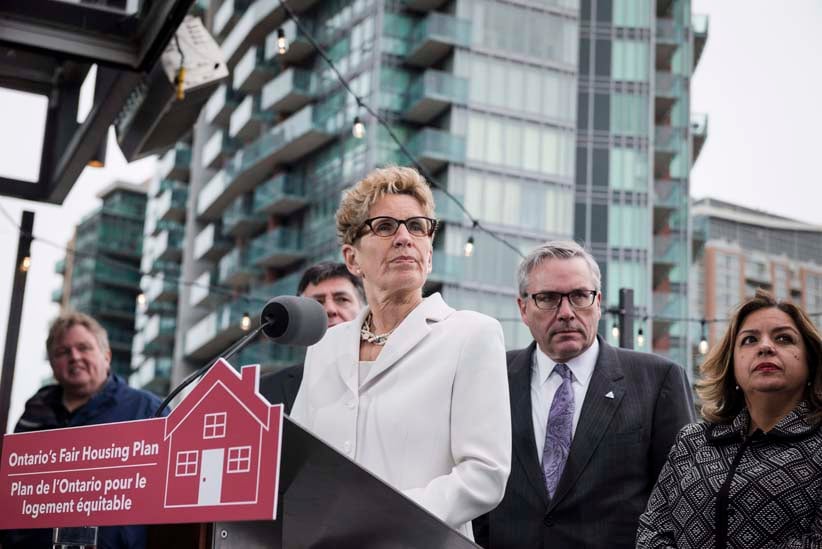Is a foreign buyers tax needed? Generations disagree
Baby boomers think it’s a great idea. Millennials don’t. Shouldn’t that be reversed?
Ontario Premier Kathleen Wynne speaks about Ontario’s Fair Housing Plan during a press conference in Toronto on Thursday, April 20, 2017. (Christopher Katsarov/CP)
Share

It’s been of the hottest topics this year in provincial politics in both British Columbia and Ontario. How do you cool an overheated real estate market? Both provinces have implemented a 15 per cent foreign buyers tax as a partial solution. Different generations are likely reacting very differently to the new levy, according to a poll conducted as part of The Canada Project. Baby boomers and millennials have different opinions on the efficacy of this tax and what how it will affect their ability to purchase a home.
Fully 82 per cent of baby boomers said they either “support or “strongly support” the foreign buyers tax compared to millennial respondents where only 69 per cent did so. It’s an odd outcome. Foreign buyers actually raise house prices, thus helping boomers, who are more likely to be homeowners, and hurting millennials, who are more likely to be looking for a first home.
[widgets_on_pages id=98]
So what’s happening here? “What this shows is that people aren’t making the connection with how the Foreign Buyer’s Tax will affect their bottom line,” says Romana King, Director of Content at Zolo.ca, a tech-powered real estate brokerage firm based in Vancouver. “Boomers don’t understand that it’s likely to reduce the selling price of their home and millennials just don’t seem to have much of an opinion on it either way.”
Vickie Campbell, a certified financial planner with Ryan Lamontagne in Ottawa has a different view. “I think the results show that boomers see the Foreign Buyers Tax as a steadying influence on a market that’s out of control and they like that,” she says. “A lot of their wealth is tied up in housing so its nice not to have the volatility that we’ve been experiencing diminished for financial planning purposes.”
Campbell also notes that boomers likely see the tax as a good tool to cool the real estate market for their kids, who are either looking for homes or soon will be. “My theory is that this tax is best for the kids—the millennials who will be searching for a home. It’s all about what’s best for the kids at this point and boomers feel this will help.”
Heather Franklin, a certified financial planner in Toronto, also notes that since a lot of millennials aren’t in the market for real estate, they really don’t have an opinion on the foreign buyers tax at all. “I see two distinct groups of millennials—those who are underemployed and still in debt, so buying a home isn’t even on their radar yet,” she says. “And a second group who is interested in it because they are gainfully employed and in the real estate market themselves looking for a starter home.”

Campbell agrees, and says we shouldn’t give up on millennials and their interest in the real estate market just yet. “They’re reading a lot about home ownership but they’re just not rushing into it,” says Campbell. “This is good. Waiting to get settled, out of debt and into a good paying job is a good thing. Home ownership will happen a little later for millennials—but it will happen.”
